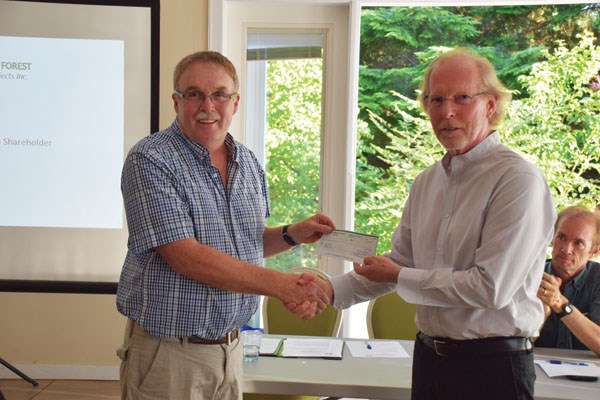The Sunshine Coast Community Forest will go forward with a board that includes several new faces after the July 23 annual general meeting of Sechelt Community Projects Incorporated (SCPI).
Sechelt Mayor Bruce Milne and Coun. Alice Lutes represented the shareholder, the District of Sechelt, at the meeting, which saw interim chair Geoff Craig confirmed as chair and for a two-year board term.
Incumbent board member Tony Greenfield was appointed to a new two-year term, and will be joined by Michael Paddison and Kathleen Suddes.
Paddison, a resident of Sechelt, has served on the district’s advisory planning commission and works with the Dakota Ridge Advisory Committee. Suddes, from Roberts Creek, is a beekeeper and honey producer and president of the Sunshine Coast Beekeepers Association.
Elise Rudland was appointed for a one-year term. The Halfmoon Bay resident and well-known conservationist also served on the Community Forest board in 2009 and on the advisory committee.
Peter Moonen, who was appointed for a two-year term in 2017, will continue with the board.
Although he wasn’t at the AGM, Glen Bonderud, who resigned as chair at the end of May, wrote the chair’s message for the SCPI annual report. “2018 is a big year for change for the management of the Community Forest,” he wrote.
The financial and operations reports presented at the AGM showed the Community Forest harvested 29,541 cubic metres of timber in 2017, with most of it going to buyers within Canada. Last year also saw the highest volume of timber sold for export in the past five years, 5,199 m3, and the lowest volume bought by local independent mills in the last five years at 94 m3.
Those timber sales brought in revenues of $3,370,763 for a net income of around $655,000. SCPI also paid a record-setting dividend of $750,000 to the District of Sechelt, which Craig said was mainly the result of a higher than usual harvest and higher than average timber prices.
During the public question period, Elphinstone Logging Focus (ELF) principal, Hans Penner, said his group welcomes the District of Sechelt’s consultations on the future direction of the Community Forest and stressed their desire to see environmental protection and support for local value-added industries high on the list of priorities.
Penner also drew attention to the amount of timber sold to buyers off Coast and for export. “In my opinion that’s not a community forest, that’s a logging operation that sells logs off the Coast… Ninety-nine per cent [of the logs] leave the Coast unprocessed, that’s worse than it was even in the ’70s and ’80s.”
Ross Muirhead, also from ELF, picked up on the theme and talked about some people he met at the recent World Café event who were from a local sawmill. Muirhead claimed they weren’t able to access Community Forest lumber.
SCPI operations manager Dave Lasser challenged that claim, and said he had been working with the mill to fill their requests but several issues, including some related to the mill’s operations, made it impossible to do business in 2017. “It was not anywhere near the picture you just heard from Ross,” he said.
Craig and a former SCPI board member, Bob Sitter, who used to be the CEO of Interfor, defended the use of a broker to manage sales.
Craig likened it to selling a house, where buyers and sellers both use brokers to get the best deals. “We have a duty to get the best price for our logs,” he said.
Sitter said selling all the logs locally, or to just one buyer, would be the worst approach. “My guess is that the log broker adds about 25 per cent value in total, because they’re telling the Community Forest which sorts to make… Then they’re getting those logs targeted to the very best price areas all over B.C.”
Local logging contractor Ken Sneddon suggested SCPI was long overdue to put its brokerage services out to tender and look for one that employs people from the Sunshine Coast. “If it’s good enough for our logging contractors to face tendering every year, why don’t you put up the brokerage every year. There’s at least four or five brokerage companies that have local residents in their employ.”



